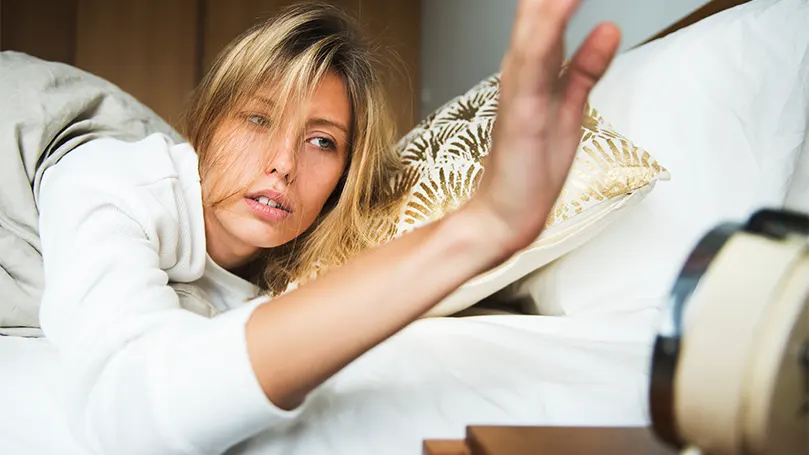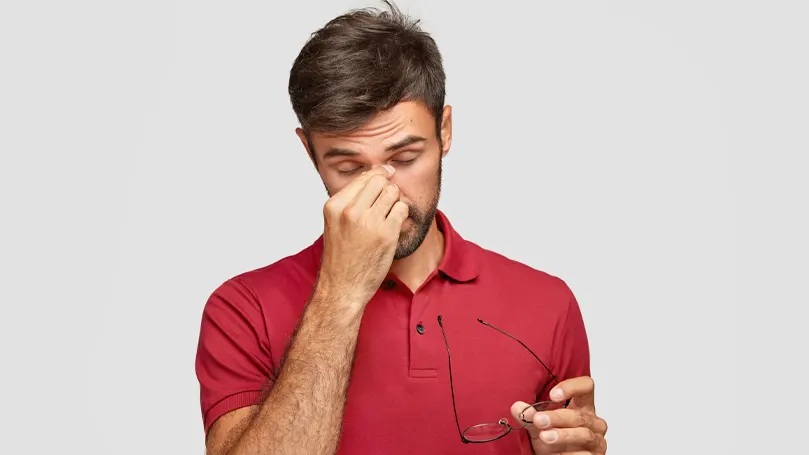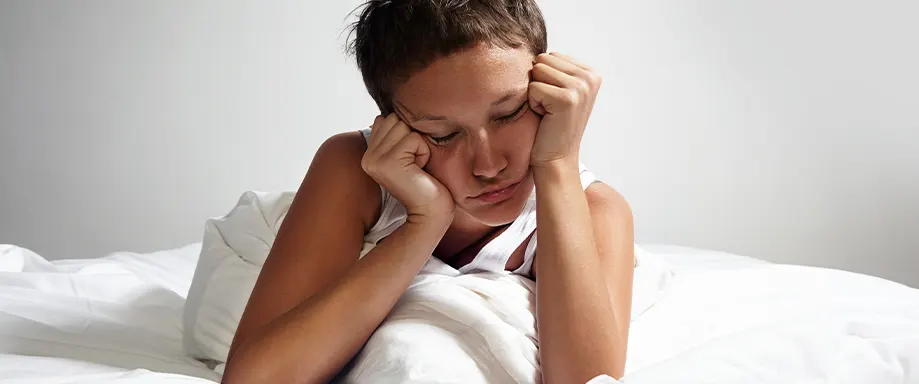Why do people with autism spectrum disorder have difficulty falling asleep?

It is estimated that 50 to 80 per cent of autistic children suffer from insomnia to some degree. And while that number is slightly lower for adults, they're still far more likely to suffer from such sleep disorders than their colleagues that are not on the spectrum. To explain the different factors at play when it comes to children with autism and sleep disorders, we're going to lean on Dr Beth Malow's categorisation.
Biological factors
When it comes to biological factors, they can be the most interesting but also the most speculative. In general, these factors deal with one's genetic makeup and how specific genes can help us fall asleep.
When it comes to children a few key differences can be inferred when comparing them to typically developing children. First off, they tend to have a higher heart rate even while asleep. They also have other forms of heightened sensitivities to stimuli. And oversensitivity is something we're going to cover in a bit more detail later on.
Aside from this, certain differences can also be seen when looking at melatonin processing, as well as differences in melatonin pathways, neurotransmitter abnormalities, and possible differences in GABA and serotonin pathways. All of that being said, it's also important to know that there is no concrete evidence that autism spectrum disorder causes sleep problems or the other way around. Rather, the two processes are just connected to a few of the same genes.
But what does all of this mean in layman's terms? Simply put, melatonin helps our biological clock (also called a circadian rhythm) know when it's time to go to sleep. Its most important trigger is darkness and it's the reason why we typically sleep at night. But if our body doesn't process melatonin in the correct way, it can cause poor sleep. It can leave us feeling energised even when we know we're supposed to go to sleep.
Medical factors
Under this category, we'd like to discuss other medical conditions that can amplify or cause sleep problems, especially in children with autism. The most common conditions are ADHD, ADD, some forms of parasomnias (like sleepwalking and Restless Legs Syndrome/Periodic Leg Movement Disorder), as well as conditions such as sleep apnea.
Given that having a sleep disorder typically disrupts sleep, it's easy to see why people on the spectrum also have sleep problems when faced with conditions. However, another important factor in this category relates to medication.
Whether it's medication taken to ease certain aspects of autism spectrum disorder or medications taken for one of the co-occurring conditions (like the ones listed above), it is possible for them to disrupt sleep. For example, in an SSC study, it was found that children with autism taking mood-regulating medication tended to sleep more while those who took sedatives and ADD medication tended to sleep less.
Of course, we don't want to make any generalisations nor do we advise going off prescribed medication on your own accord. However, seeing your GP and potentially doing a sleep study could give you further insight into what your body is reacting to.
Behavioural factors
Of the three main categories we've mentioned, behavioural factors are the ones you arguably have the most control over. That's because it refers to how different bedtime routines or dietary options can disrupt your sleep. This is especially important for a child's sleep, as they tend to be a bit more sensitive in this regard.
As with everything so far, there's no one-size-fits-all, however, there are certain practices that can make falling asleep more difficult. For example, looking at screens before bed has been shown to suppress our melatonin levels. That makes falling asleep more difficult. This is especially true for children, as they tend to be more sensitive to blue light. Other factors in this category include consuming caffeine, getting engrossed in a movie/video game, and going to bed too early/too late.
However, it's worth pointing out that not all the factors in this category are obvious. For example, webinar from Dr Beth Malow explains how even rubbing your child's back before sleep can cause problems. That's because the child might strictly associate sleep with your presence. We will discuss creating a good bedtime routine later on.
Sleep challenges commonly experienced by those with autism

Now that we've gotten the scientific background out of the way, we'd like to discuss specific sleep problems that people with an autism spectrum disorder might face. First off, as we've mentioned already, sleep disorders such as insomnia are notably common.
Not only that but people on the spectrum on average also get less REM sleep than their typically developing colleagues (with an 8% average difference). The result of getting less REM sleep, which is critical for learning and memory retention, is that people on the spectrum can score lower (on average) on IQ tests and have more pronounced difficulties in certain social interactions.
Overstimulation and mental health
And this brings us to two other important factors that we haven't fully discussed thus far. First off, overstimulation. Even if a person on the spectrum doesn't have a diagnosed sleep disorder they can sometimes have difficulty sleeping due to certain stimulants. One of the more common ones is light. Be it a billboard visible from the bedroom window or the blue light coming off your phone when you scroll before going to bed, it can cause issues.
However, other stimulants can also cause similar effects, like touch, smell, or a certain sound that just draws your attention. Even just watching a really good movie before bed can act in a similar manner. That's because your mind will be preoccupied thinking about what happened.
And this leads us to the second common sleep challenge – mental health. While it's not an exact science, research does suggest that people on the spectrum are more likely to suffer from depression than their colleagues. Not only that but they also commonly have issues with anxiety, especially at night. Both of these factors can have a significant influence on their sleep patterns. That because heightened cortisol levels can make falling asleep more difficult.
Strategies for improving sleep for those with autism
Now we know what can cause sleep problems for people with autism. As we know what those problems may manifest as, it's time to talk about solutions. Of course, we can't claim that any of these strategies can nullify the issue at its source. However, it can help those on the spectrum fall asleep more easily.
That being said, there are just going to be some general strategies. We'll cover medication in the following section and talk about more general behavioural strategies here. However, any serious change should be done while consulting your GP or a sleep specialist.
Make a relaxing bedtime routine

One of the best ways to ease the wake-sleep transition is to create a relaxing routine that you/your child can stick to consistently. Generally speaking, going to bed and waking up at the same time can help your body's circadian rhythm stay on track and thus allow for a healthy sleep duration.
Plus, incorporating relaxing activities has the added benefit of easing some of the stress people on the spectrum might feel at night. The only rule is that it shouldn't be overly stimulating or have you looking at a screen.
Some might like writing in a sleep diary in the morning and then reading through it before bed. Others could do with light stretching or meditation. Whatever the case might be, just make sure that the person is comfortable and that the activity helps them relax.
Cutting out screen time
Not looking at a screen before bed is always good advice. And if your child falls asleep with a phone in their hand, it's even more beneficial since they're very sensitive to blue light. So, if possible, try to avoid any electronic device at least 30-60 minutes before bed.
Not only will this help on a physical level since your melatonin levels won't be suppressed but it can also help on an emotional level. After all, seeing an interesting video or a disturbing picture late at night can have you awake for hours thinking about it.
The role of medications in improving sleep for those with autism

When it comes to sleep medication, there doesn't seem to be a straightforward answer. As we've mentioned, people with autism tend to be a bit more sensitive to certain stimuli. And it's not rare for sleep disorders to co-occur with their condition. So, when it comes to drinking different kinds of medication, it can be tricky.
We asked Dr Jay Slosar, the psychologist at Practicalpie, for their input on the matter, to which they replied: “Those with ASD may be more sensitive to or have bad responses to sleep prescriptions. As a result, it is critical to consult with a healthcare physician who has expertise in treating sleep difficulties in people with ASD. Therefore, after considering non-pharmacological therapies, sleep drugs should be used as a last option.”
However, on the other hand, Dr Malow suggests that supplements such as melatonin are rather benign overall and can help with sleep difficulties. Given how individuals with autism tend to have lower melatonin levels (as covered in the biological factors section), supplementing it externally can help the body better regulate the sleep-wake cycle.
Conclusion: The importance of sleep for those with autism
Whether you have autism spectrum disorder or are caring for a child on the spectrum, knowledge is power. So, we hope that the many facets we've covered have helped you better understand autism and the many ways it influences sleep.
There are still lots of factors at play and we don't have all the answers. However, trying to work in some sort of relaxing bedtime routine, avoiding blue light, and consulting a professional to get melatonin supplements or other appropriate medication all seem like good courses of action. And above all, love, care, and respect those around you, as a happy and clear mind is much more likely to drift off into a deep sleep. And feel free to tell us about your experience on autism and sleep down in the comments.
Spread the word
Recommended reading:














There are no comments yet
"*" indicates required fields